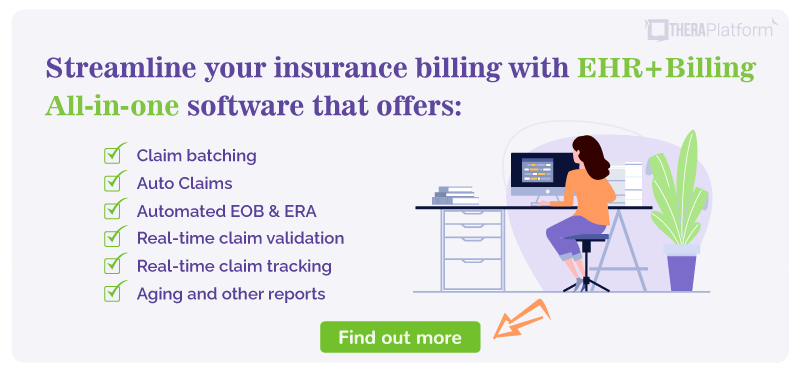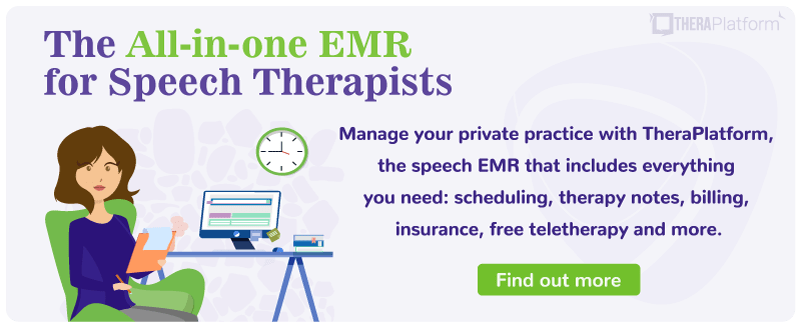Mixed receptive expressive language disorder ICD 10

Mixed Receptive-Expressive Language Disorder ICD 10 code is one of the most common billing codes used by Speech-Language Pathologists.
If you’re an SLP working in a health care setting or private therapy practice, you likely see ICD-10 codes daily in documentation like referrals, therapy notes, and evaluation reports.
→ Click here to enroll in our free on-demand Insurance Billing for Therapists video course [Enroll Now]
But, what exactly is an ICD-10? And why is it imperative for SLP’s to be familiar with ICD-10 codes, know how to use them, and keep up with changes to codes?
What is ICD-10?
ICD-10 is owned by the World Health Organization (WHO), and stands for the International Classification of Diseases, 10th Revision. It’s the official system used in the United States to assign health care codes that correspond to various diagnoses and procedures.

ICD-10-CM is included under ICD-10. The “CM” (Clinical Modification), was developed by the CDC (Centers for Disease Control & Prevention) to be used across U.S. healthcare settings. On October 1, 2021, the most current, 2022, edition of the ICD-10-CM codes became effective.
We know what you’re thinking. All of these acronyms are enough to make an SLP’s head spin. But not to worry! Here’s what you really need to know.
SLP’s are required to use ICD-10 codes, such as the Mixed Receptive-Expressive Language Disorder ICD 10, when diagnosing clients and charging for procedures in order to comply with HIPAA regulations and for payment by Medicare, Medicaid, and private insurance companies.
Lacking knowledge of the ICD-10 codes pertinent to your clients and a failure to stay up to date on the latest changes could result in insurance denials for your practice.
Mixed Receptive-Expressive Language Disorder ICD 10 code
The Mixed Receptive-Expressive Language Disorder ICD 10 code is F80.2.
According to the American Speech Language Hearing Association (ASHA), Speech-Language Pathologists should choose the code(s) that “provide the greatest degree of accuracy and completeness”.
Meaning, it’s crucial to know the specific characteristics of a given diagnosis and to be sure that these characteristics accurately describe your client’s difficulties.
A Mixed Receptive Expressive Language Disorder is a disorder characterized by difficulties with both understanding language (Receptive Language Disorder) and using language to communicate (Expressive Language Disorder).
This disorder can be seen in clients who are of a range of ages, from toddlers to adults.
A young child with a Mixed Receptive-Expressive Language Disorder may have difficulties understanding age-appropriate concepts, such as identifying body parts or the names of common objects. They may also have a limited vocabulary, and not speak as many words as expected for their age.
School-aged children with this disorder can show characteristics such as trouble understanding directions, remembering information. They can also have difficulty putting words together with correct grammar in order to effectively communicate their wants, needs, and thoughts to others.
Adult clients with a Mixed Receptive-Expressive Language Disorder may have difficulty both understanding and using language due to a traumatic brain injury, stroke, or progressive disorder.
A Mixed Receptive Expressive Language Disorder can range in severity, from mild to severe.
Watch this video to learn common insurance billing struggles and solutions
→ Start My Free Trial
→ Start My Free Trial
What does Mixed Receptive-Expressive Language Disorder ICD 10 F80.2 include and exclude?
The criteria symptoms for the diagnosis of F80.2, or the Mixed Receptive Expressive Language Disorder ICD-10 code, include the following:
- Both a Receptive Language Disorder and an Expressive Language Disorder
- May include: Developmental Dysphasia or Aphasia, receptive type
- May include: Developmental Wernicke’s Aphasia
The exclusions for Mixed Receptive-Expressive Language Disorder ICD 10, F80.2 include:
- Central Auditory Processing Disorder
- Dysphasia or Aphasia NOS
- Acquired Aphasia with Epilepsy
- Pervasive Developmental Disorders
- Intellectual Disabilities
- Selective Mutism
The above disorders have other specific ICD-10 codes, outside of Mixed Receptive-Expressive Language Disorder ICD 10, that SLP’s should refer to when completing documentation such as evaluations and treatment notes.
→ Download My Free Insurance Billing Guide
Prevalence of a Mixed Receptive-Expressive Language Disorder
Most SLP’s working in a healthcare or private setting have clients with a Mixed Receptive-Expressive Language Disorder on their caseload.
The disorder can be considered common in both children and adults in the United States.
According to data from the National Department of Health and Human Services, nearly 1 in 12 (7.7%) children in the U.S. between the ages of 3-17 has had a disorder related to voice, speech, language, or swallowing within the past 12 months.
In regards to language in specific, government statistics report that over 3% of children in the U.S. have had a language disorder in the past 12 months that lasted at least 1 week.
Language disorders frequently occur in the adult population as well. Currently about 1 million individuals in the U.S. have Aphasia. Certain types of Aphasia are coded under F80.2: Mixed Receptive Expressive Language Disorder ICD 10 code.
When do ICD-10 codes change?
ICD-10 codes are updated annually. They are released and effective October 1st each year, and it’s important for SLP’s to stay up to date with the changes in order to maintain compliance with HIPAA and insurance requirements.
What’s the easiest way for therapists to find accurate information on the latest ICD-10 code updates?
The Centers for Medicare & Medicaid Services (CMS) provide several coding resources on their website. These include an ICD-10 code lookup tool. The CDC (Center for Disease Control and Prevention) also offers an ICD-10-CM Lookup tool. This allows providers to search for specific codes or disorders for the current fiscal year.
Speech-Language Pathologists can utilize resources through ASHA (the American Speech Language Hearing Association) for guidance on coding, such as when to use the F80.2 Mixed Receptive Expressive Language Disorder ICD-10 code.
More resources for using ICD-10 codes
ICD-10 codes, particularly the Mixed Receptive Expressive Language Disorder ICD 10 code, are important for SLPs to have up to date knowledge on in order to comply with HIPAA and Insurance requirements.
Start 30-day Free Trial and explore TheraPlatform. HIPAA Compliant Video and Practice Management Software for Therapists.
How EHR and practice management software can save speech therapists time on insurance billing
EHR with integrated billing software and a clearing house, such as TheraPlatform, offers speech therapists significant advantages in creating an efficient insurance billing process. The key is minimizing the amount of time dedicated to developing, sending, and tracking medical claims through features such as automation and batching.
What are automation and batching?
- Automation refers to setting up software to perform tasks with limited human interaction.
- Batching or performing administrative tasks in blocks of time at once allows you to perform a task from a single entry point with less clicking.
Which billing and medical claim tasks can be automated and batched through billing software?
- Invoices: Create multiple invoices for multiple clients with a click or two of a button or set up auto-invoice creation, and the software will automatically create invoices for you at the preferred time. You can even have the system automatically send invoices to your clients.
- Credit card processing: Charge multiple clients with a click of a button or set up auto credit card billing, and the billing software will automatically charge the card (easier than swiping!)
- Email payment reminders: Never manually send another reminder email for payment again, or skip this altogether by enabling auto credit card charges.
- Automated claim creation and submission: Batch multiple claims with one button click or turn auto claim creation and submission on.
- Live claim validation: The system reviews each claim to catch any human errors before submission, saving you time and reducing rejected claims.
- Automated payment posting: Streamline posting procedures for paid medical claims with ERA. When insurance offers ERA, all their payments will post automatically on TheraPlatform's EHR.
- Tracking: Track payment and profits, including aging invoices, overdue invoices, transactions, billed services, service providers.
Utilizing billing software integrated with an EHR and practice management software can make storing and sharing billing and insurance easy and save speech therapy providers time when it comes to insurance billing for therapists.
Resources
TheraPlatform is an all-in-one EHR, practice management, and teletherapy software built for therapists to help them save time on admin tasks. It offers a 30-day risk-free trial with no credit card required and supports different industries and sizes of practices, including speech-language pathologists in group and solo practices.

More resources
- Therapy resources and worksheets
- Therapy private practice courses
- Ultimate teletherapy ebook
- The Ultimate Insurance Billing Guide for Therapists
- The Ultimate Guide to Starting a Private Therapy Practice
- Insurance billing 101
- Practice management tools



